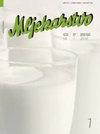日粮南瓜饼和亚麻籽对高山山羊泌乳早期血液化学成分和乳汁质量的影响
IF 1.1
4区 农林科学
Q3 AGRICULTURE, DAIRY & ANIMAL SCIENCE
引用次数: 3
摘要
南瓜籽饼(PSC)由于其粗蛋白含量高、不饱和脂肪酸浓度高,可作为反刍动物的优质饲料,而膨化亚麻籽(ELS)已对羊奶中的脂肪酸比例显示出一定的有益作用。此外,哺乳期是监测动物代谢状况要求最高的时期。因此,本研究的目的是确定PSC和ELS代替豆粕对奶山羊血液化学参数和牛奶质量的影响。对28只泌乳期的法国阿尔卑斯奶山羊在泌乳早期20天内进行了监测。各组日粮能量和粗蛋白含量平衡,脂质含量略有差异。对照组(n=9)的山羊接受豆粕和挤压大豆。在实验组中,大豆被ELS部分取代(n=10)或被PSC完全取代(n=9)。膳食处理对血液化学参数没有影响,尽管PSC增加了血清中球蛋白的浓度。与对照组相比,PSC降低了亚油酸。ELS增加了牛奶中α-亚麻酸、二十碳五烯酸和总n-3脂肪酸的比例。非酯化脂肪酸(NEFA)与C18:1/C15:0比值、NEFA与C17:0/C15:0比值、β-羟基丁酸酯与C17:0/15:0比值呈正相关。就早期泌乳奶山羊的血液化学参数而言,用PSC或部分用ELS代替豆粕是可行的,而与PSC相比,ELS对脂肪酸有很大的有益作用。本文章由计算机程序翻译,如有差异,请以英文原文为准。
The effect of dietary pumpkin seed cake and extruded linseed on blood haemato-chemicals and milk quality in Alpine goats during early lactation
Due to the high content of crude protein and high concentration of unsaturated fatty acids, pumpkin seed cake (PSC) could be a good quality feedstuff for ruminants, while extruded linseed (ELS) has already shown some beneficial effect on fatty acids proportion of goat milk. Besides, lactation is the most demanding period when monitoring the metabolic condition of animal. Therefore, the aim of this study was to determine the effect of PSC and ELS replacing soybean meal in diets of dairy goats on blood haemato-chemical parameters and milk quality. A 28 lactating French Alpine dairy goats were monitored within 20 days in early lactation. Diet of each groups had a balanced content of energy and crude protein, and a slight difference in lipid content. Goats in control group (n = 9) received soybean meal and extruded soybean. In experimental groups soybean was partially replaced with ELS (n = 10) or completely with PSC (n = 9). Dietary treatments had no effect on haemato-chemical parameters, although PSC increased concentration of globulins in serum. PSC lowered linoleic acid compared to control. ELS increased proportion of α-linolenic acid, eicosapentaenoic acid, and total n-3 fatty acids in milk. Positive correlations were found between non-esterified fatty acids (NEFA) and ratio C18:1/C15:0, NEFA and ratio C17:0/C15:0, as well as β-hydroxybutyrate and ratio C17:0/C15:0. The replacement of soybean meal with PSC or partially with ELS is feasible with respect to haemato-chemical parameters of early lactating dairy goats, while ELS had much beneficial effect on fatty acids compared to PSC.
求助全文
通过发布文献求助,成功后即可免费获取论文全文。
去求助
来源期刊

Mljekarstvo
Agricultural and Biological Sciences-Animal Science and Zoology
CiteScore
1.90
自引率
41.70%
发文量
18
审稿时长
12 weeks
期刊介绍:
Mljekarstvo is an open access, peer-reviewed international quarterly scientific journal. The first issue was published in 1951, by the Croatian Dairy Operators'' Association (today: Croatian Dairy Union, publisher). In a paper at a Union conference held 28 October 1951 in Zagreb it was said: "Our desire is that this magazine does not meet the fate of its predecessors, but that it continues to reflect the creative efforts and to provide guidelines for the producers as well as all other operators employed in the dairy industry."
It is our pleasure today to say that wishes of the enthusiasts who attended the conference have come true, and the magazine Mljekarstvo during the last six decades was a reflection of the creative efforts of numerous dairy scientists and experts, and through its texts it served as a guideline in improving production and processing of milk and dairy products. Mljekarstvo has been following all the achievements of the dairy profession in Croatia, and it also gives the short surveys of world achievements. The result of the research of local and foreign scientists and experts always find their place in the magazine Mljekarstvo. It has been edited by our outstanding dairy experts employed at colleges, research institutions and dairy companies.
 求助内容:
求助内容: 应助结果提醒方式:
应助结果提醒方式:


